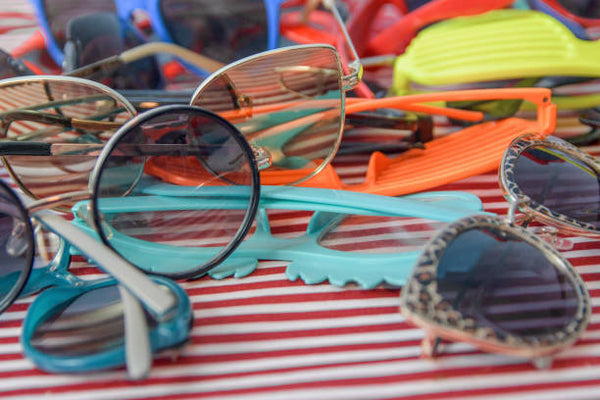When it comes to protecting your eyes from the sun, many people assume that any pair of glasses with tinted lenses will do the job. But the truth is that fake glasses, cheap eyewear, and poorly made sunglasses can do more harm than good. In fact, wearing fake eye glasses or cheap sunglasses may actually put your vision at greater risk compared to not wearing sunglasses at all.
In this guide, we’ll explore why low-quality eyewear is dangerous, how to spot it, and how to choose the right pair of cheap glasses with lenses that won’t compromise your eye health.
How Sunglasses Protect Your Eyes
High-quality sunglasses are not just a fashion accessory—they are a medical necessity. They work by blocking harmful UV rays, reducing glare, and shielding your eyes from dust and wind. Prolonged exposure to UV light without proper protection can lead to:
-
Cataracts
-
Macular degeneration
-
Photokeratitis (sunburn of the eyes)
-
Pterygium (growths on the white of the eye)
When made properly, sunglasses act like sunscreen for your eyes, giving you peace of mind whether you’re driving, at the beach, or walking in the city. But this protection only works if the glasses meet the right safety standards.
Suggested Read: Benefits of UV Protection in Sunglasses and Eyeglasses
The Hidden Dangers of Fake and Cheap Sunglasses
Cheap eyewear often comes with tinted lenses that may look protective but don’t actually block UV rays. Instead, they create a dangerous illusion: your pupils dilate behind the darkened lenses, letting in even more harmful radiation. This means your eyes are more exposed than if you weren’t wearing sunglasses at all.
Other hidden risks of fake glasses include:
-
Poor lens quality – causing eye strain, headaches, and blurred vision.
-
No UV certification – leaving your eyes unprotected from sun damage.
-
Weak frames – that break easily, potentially injuring you.
-
Counterfeit branding – making it harder to tell if you’re buying safe eyewear.
Ultimately, fake eye glasses are not just a waste of money—they are a direct threat to your eye health.

Why Wearing No Sunglasses Can Be Safer than Wearing Fake Ones
It may sound surprising, but in many cases, cheap eye glasses without UV protection are worse than wearing no glasses at all. When you’re not wearing sunglasses, your pupils naturally constrict in bright sunlight, limiting the amount of UV radiation entering your eyes.
With fake glasses, however, the tinted lens fools your eyes into opening wider, allowing in a flood of damaging rays. This accelerates long-term eye damage, particularly in regions like Kenya, Zambia, Uganda, and Rwanda, where sunlight is strong year-round.
How to Identify Fake or Cheap Sunglasses
With so many counterfeit products in the market, it’s important to know how to spot unsafe eyewear. Here are a few tips:
-
Check for UV protection labels – Look for “100% UV protection” or “UV400.”
-
Buy from trusted retailers – Avoid street vendors or unknown online sellers.
-
Examine the lenses – Poor quality lenses may have bubbles, scratches, or uneven tint.
-
Test for distortion – Look at a straight line through the lens. If it bends or warps, the glasses are poor quality.
-
Check the weight and feel – Extremely light, flimsy frames are often a sign of cheap manufacturing.
If you’re unsure, visit a trusted optical store where experts can guide you.
Tips for Choosing the Right Sunglasses
Investing in the right pair of sunglasses doesn’t have to be expensive. The key is to balance affordability with safety. When shopping for cheap glasses with lenses that are still safe, follow these guidelines:
-
Go for brands that are transparent about UV protection.
-
Choose polarized lenses for reducing glare, especially when driving.
-
Consider durable frames with a manufacturer’s warranty.
-
Select lenses that complement your prescription, if you need corrective glasses.
-
Buy from reputable stores that offer free adjustments and repairs.
By following these steps, you can enjoy stylish, comfortable, and protective sunglasses without risking your vision.
Conclusion
The bottom line is simple: fake glasses and cheap eyewear are not worth the risk. Your eyes are too important to compromise for the sake of saving a little money. In fact, in the long run, investing in proper eyewear will save you from costly treatments and irreversible eye damage.
When in doubt, always choose quality over imitation. Your vision is worth it.
FAQ
Are fake sunglasses bad for your eyes?
Yes. Fake sunglasses don’t block harmful UV rays, which increases your risk of cataracts, macular degeneration, and other eye problems.
Is it safe to buy fake sunglasses?
No. Fake sunglasses may look stylish but they don’t protect your eyes. It’s always safer to buy from reputable brands or trusted optical retailers.
What to avoid when buying sunglasses?
Avoid sunglasses without UV protection, those with poor-quality lenses, and those sold by unreliable vendors. Always check for certification and guarantees.

